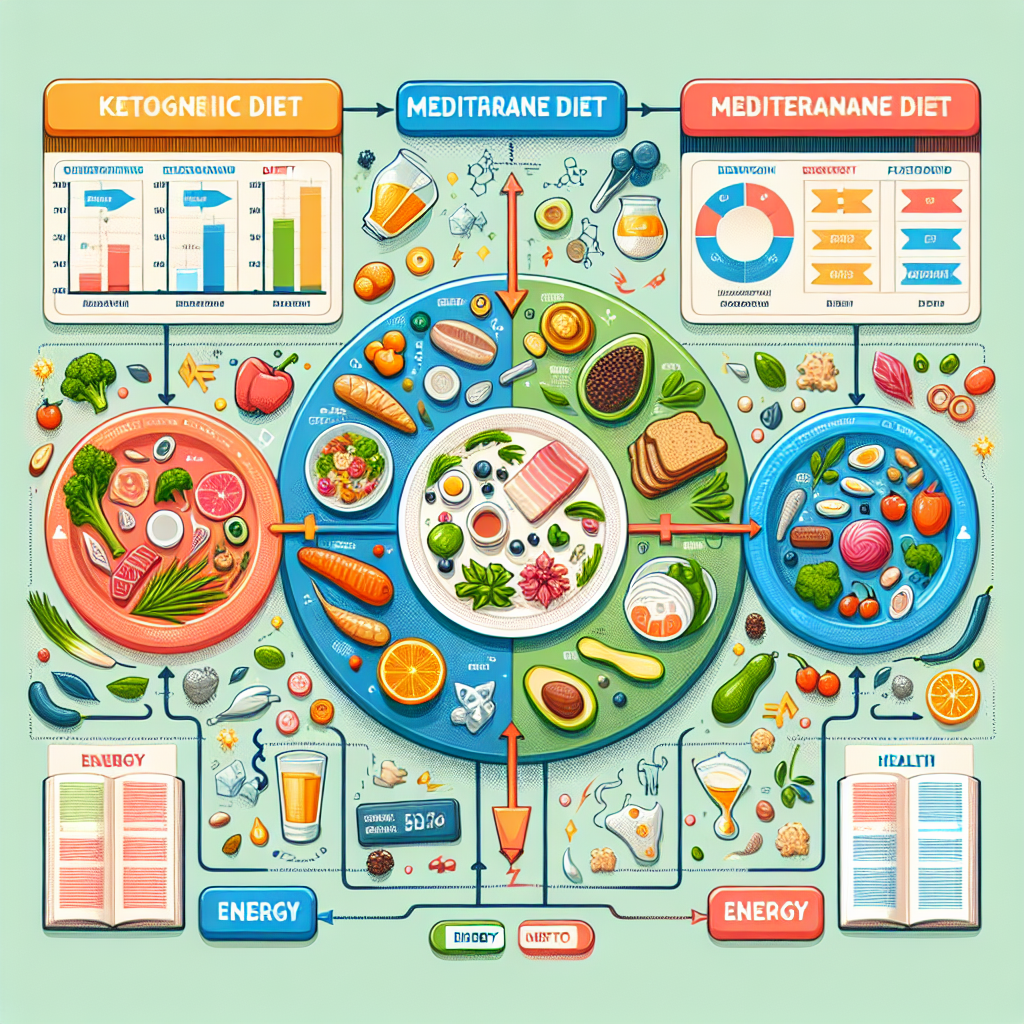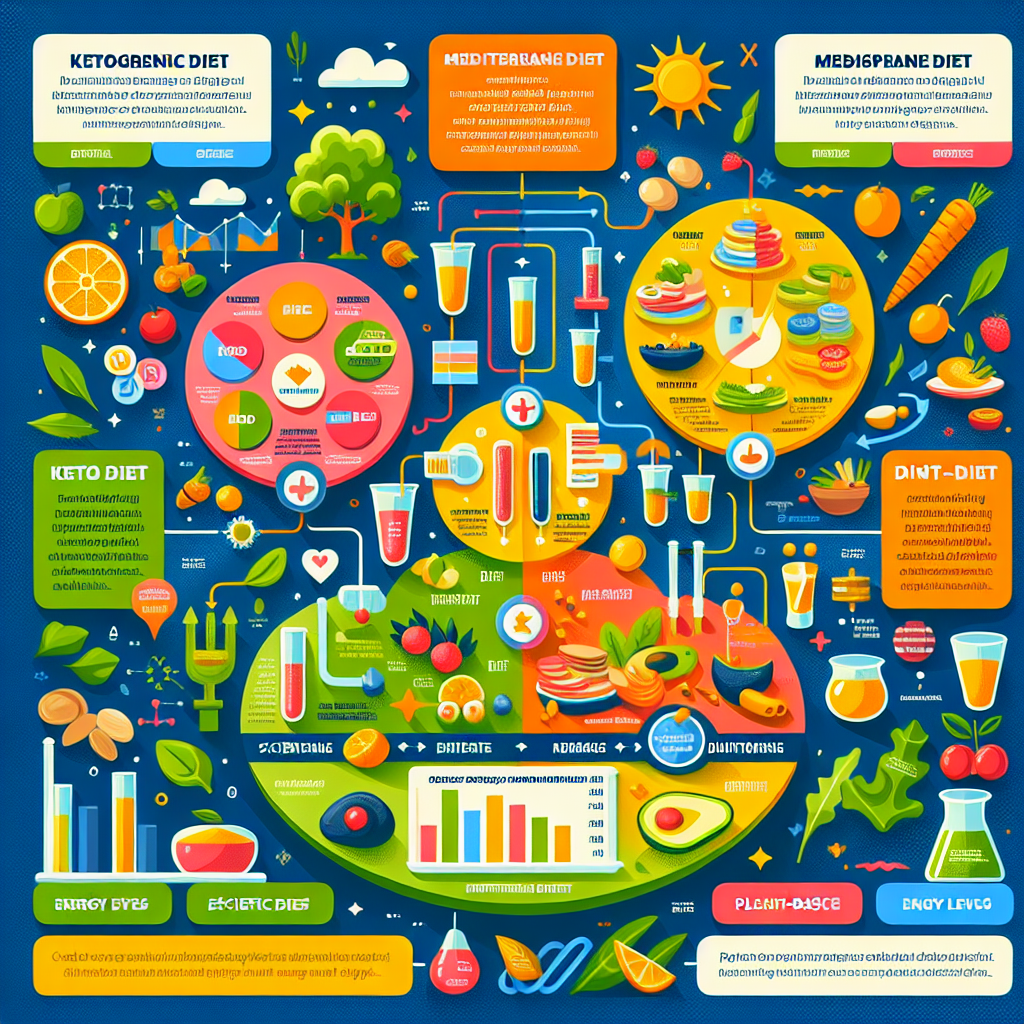Are There Specific Diets That Improve Energy Levels? You’re constantly on the go, juggling work, family, and social commitments, leaving you exhausted by the end of the day. But what if there was a way to boost your energy levels naturally? In this article, we explore whether specific diets can help improve your energy levels. Whether you’re a high achiever looking for an extra edge or simply seeking a way to combat fatigue, read on to discover the potential benefits of certain diets on your overall energy and well-being.
Low-carb diets
Ketogenic diet
The ketogenic diet is a low-carb, high-fat diet that has gained popularity in recent years. By drastically reducing carbohydrate intake and increasing fat consumption, the body enters a state called ketosis. During ketosis, the body breaks down fat for fuel instead of relying on carbohydrates. This can help stabilize energy levels throughout the day, as there are no spikes and crashes in blood sugar levels. However, it’s important to note that the transition into ketosis may cause temporary fatigue and an adjustment period is necessary.
Atkins diet
The Atkins diet is another low-carb diet that focuses on restricting carbohydrate intake. It consists of several phases, with the initial phase being the most strict in terms of carb restriction. By limiting carbs, the body is forced to burn stored fat for energy. This can result in Sustained energy levels, as there are no fluctuations in blood sugar levels that occur with high-carb meals. However, it’s essential to choose healthy sources of fat and protein while following the Atkins diet to ensure overall nutritional balance.
Paleo diet
The Paleo diet revolves around consuming foods that our ancestors would have eaten during the Paleolithic era. This includes meat, fish, vegetables, fruits, nuts, and seeds, while avoiding processed foods, grains, dairy, and refined sugars. By focusing on whole foods and eliminating processed carbohydrates, individuals following the Paleo diet may experience improved energy levels. The emphasis on lean protein and healthy fats helps to provide sustained energy throughout the day, without the crashes that can occur with high-carb meals.
South Beach diet
The South Beach diet is a low-carb diet that aims to shift the body from relying on carbohydrates for energy to burning stored fat. It consists of three phases, with an initial phase that restricts carbohydrate intake significantly. By limiting carbohydrates, the body is encouraged to use fat as its primary fuel source. This can lead to stable energy levels throughout the day, as there are no rapid spikes and drops in blood sugar levels. The South Beach diet also encourages consuming lean protein, healthy fats, and non-starchy vegetables, which can support sustained energy.
High-protein diets
Dukan diet
The Dukan diet is a high-protein, low-carb diet that consists of four phases. During the initial phase, carbohydrates are almost entirely eliminated, and the focus is on consuming lean protein. The high protein intake can help stabilize energy levels by providing a steady source of amino acids for muscle repair and maintenance. However, it’s crucial to ensure that the diet includes a variety of protein sources to obtain all essential amino acids and to balance it with healthy fats and vegetables to maintain Overall nutritional balance.
Mediterranean diet with increased protein intake
The Mediterranean diet is known for its emphasis on whole, unprocessed foods such as fruits, vegetables, whole grains, legumes, and lean proteins. While traditionally not a high-protein diet, increasing protein intake within the context of the Mediterranean diet can provide sustained energy. Protein takes longer to digest than carbohydrates, leading to a slower release of energy. By incorporating lean sources of protein such as fish, poultry, and legumes, individuals may experience improved energy levels throughout the day.
Zone diet
The Zone diet is a balanced eating plan that focuses on consuming a specific ratio of macronutrients: 40% carbohydrates, 30% protein, and 30% fat. This approach aims to stabilize blood sugar levels and maintain steady energy throughout the day. By providing an adequate amount of protein, the Zone diet helps to promote sustained energy levels. Additionally, the emphasis on whole foods and healthy fats supports Overall well-being and can contribute to improved energy and vitality.
Scandinavian diet with emphasis on fish
The Scandinavian diet, inspired by the eating habits of individuals living in Nordic countries, includes a variety of nutrient-rich foods such as fish, whole grains, berries, root vegetables, and dairy products. With a particular emphasis on fish, which is rich in omega-3 fatty acids, this diet can support sustained energy levels. Omega-3 fatty acids have been linked to improved cognitive function and decreased inflammation, both of which can contribute to enhanced energy and overall well-being.
Plant-based diets
Vegetarian diet
A vegetarian diet eliminates meat, poultry, and seafood while allowing for the consumption of plant-based foods such as fruits, vegetables, grains, legumes, nuts, and seeds. While energy levels can vary among individuals following a vegetarian diet, it is possible to have sustained energy levels by incorporating a diverse range of plant-based foods. Vegetarian options rich in protein, such as tofu, tempeh, lentils, and beans, can help provide a consistent source of energy throughout the day.
Vegan diet
A vegan diet takes plant-based eating a step further by eliminating all animal products, including eggs and dairy. As with a vegetarian diet, it is essential to ensure proper nutrient intake to support energy levels on a vegan diet. Consuming a variety of plant-based proteins, such as legumes, quinoa, nuts, and seeds, along with ample fruits, vegetables, and whole grains, can provide the necessary nutrients for sustained energy. However, it may be prudent for vegans to pay close attention to vitamin B12 and iron levels, as these can impact overall energy levels.
Whole-food plant-based diet
A whole-food plant-based diet focuses on consuming unprocessed plant foods while minimizing or eliminating animal products and processed foods. This approach prioritizes whole grains, fruits, vegetables, legumes, nuts, and seeds. By emphasizing nutrient-dense, fiber-rich foods, individuals following a whole-food plant-based diet can experience sustained energy levels. The combination of complex carbohydrates, healthy fats, and plant-based proteins supports a steady release of energy throughout the day.
Flexitarian diet
The flexitarian diet is a flexible approach to eating that emphasizes plant-based foods while allowing for occasional inclusion of meat and animal products. By focusing on plant-based meals, individuals can benefit from the sustained energy levels associated with a plant-based diet. Incorporating a variety of plant-based proteins, whole grains, fruits, and vegetables can provide essential nutrients and promote consistent energy throughout the day.
Caffeine and energy levels
Effects of caffeine on energy
Caffeine is a stimulant that affects the central nervous system by blocking the action of adenosine, a neurotransmitter that promotes sleep and relaxation. As a result, caffeine can increase alertness and temporarily boost energy levels. However, it’s important to note that caffeine affects individuals differently, and some may experience jitters, increased heart rate, or a crash in energy once the effects wear off. Moderation is key when consuming caffeine to avoid potential negative effects on energy levels.
Coffee and energy levels
Coffee is one of the most popular sources of caffeine. It is well-known for its ability to provide an energy boost due to its caffeine content. The caffeine in coffee stimulates the release of neurotransmitters like dopamine and norepinephrine, which can lead to increased focus and alertness. However, it’s important to consume coffee in moderation and be aware of individual caffeine sensitivity. Drinking too much coffee or relying on it as the sole source of energy can lead to dependence and potential negative effects on sleep quality.
Tea for an energy boost
Tea, particularly green and black tea, also contains caffeine, although in smaller amounts compared to coffee. The combination of caffeine and other natural compounds in tea, such as L-theanine, can provide a more gradual and sustained energy boost without the jitters associated with coffee. The L-theanine in tea helps to promote relaxation and focus, counteracting some of the potential negative effects of caffeine. Choosing tea as an alternative to coffee can provide a gentler energy boost throughout the day.
Energy drinks and their impact
Energy drinks are often marketed as a quick fix for low energy levels, particularly among individuals leading a busy and demanding lifestyle. While they do contain caffeine, energy drinks also typically contain high amounts of sugar and other stimulants. The combination of caffeine, sugar, and other ingredients can lead to a temporary energy spike, but this is often followed by a crash. Moreover, the excessive sugar content can contribute to long-term negative health effects. It’s best to approach energy drinks with caution and consider healthier alternatives for sustained energy.

Dietary fats
Healthy fat sources
Dietary fats are essential for overall health and serve as a crucial source of energy. Healthy fat sources include avocados, nuts, seeds, olive oil, and fatty fish such as salmon and mackerel. These fats provide the body with essential fatty acids and support the absorption of fat-soluble vitamins. Incorporating a moderate amount of healthy fats into the diet can help provide sustained energy, as fats are slower to digest compared to carbohydrates.
Omega-3 fatty acids
Omega-3 fatty acids are a type of healthy fat that have been shown to have numerous health benefits, including supporting brain health and reducing inflammation. Sources of omega-3s include fatty fish like salmon, chia seeds, walnuts, flaxseeds, and algae-based supplements. Consuming omega-3 fatty acids can contribute to improved energy levels, as they support optimal brain function and help regulate inflammation, which can otherwise lead to fatigue.
Saturated fats and energy
While saturated fats have been associated with negative health effects when consumed in excess, they are still a necessary part of a balanced diet. Sources of saturated fats include fatty cuts of meat, full-fat dairy products, and coconut oil. While it’s important to consume saturated fats in moderation, they can provide a concentrated source of energy. However, it’s essential to choose lean sources of protein and balance saturated fats with healthier fats to maintain overall health.
Trans fats and energy levels
Trans fats are found primarily in processed and fried foods, including fast foods, packaged snacks, and baked goods. These fats are known to increase the risk of heart disease and have negative effects on overall health. When it comes to energy levels, trans fats are considered detrimental. Consuming foods high in trans fats can lead to inflammation, which can result in fatigue and decreased energy levels. It’s best to avoid or minimize consumption of trans fats for optimal energy and overall well-being.
Complex carbohydrates for sustained energy
Whole grains
Whole grains, such as oats, quinoa, brown rice, and whole wheat bread, are rich in complex carbohydrates, fiber, vitamins, and minerals. Unlike refined grains, whole grains are digested more slowly, providing a steady release of energy over an extended period. Consuming whole grains as part of a balanced diet can help maintain consistent energy levels throughout the day and support overall health.
Fruits and vegetables
Fruits and vegetables are excellent sources of complex carbohydrates, fiber, and various vitamins and minerals. They provide a steady release of energy while offering a wide range of health benefits. The fiber content in fruits and vegetables helps to slow down digestion and promote a more sustained release of energy. Additionally, the vitamins and minerals present contribute to overall well-being and can support optimal energy levels.
Beans and legumes
Beans and legumes, including chickpeas, lentils, black beans, and kidney beans, are nutrient-dense foods rich in complex carbohydrates, fiber, protein, and various vitamins and minerals. Due to their high fiber and protein content, beans and legumes have a low glycemic index, meaning they have a minimal impact on blood sugar levels. This can result in sustained energy levels and feelings of satiety, preventing energy crashes often associated with high-carbohydrate meals.
Benefits of consuming complex carbs
Consuming complex carbohydrates offers several benefits for sustained energy levels. Unlike simple carbohydrates found in refined sugars and processed foods, complex carbohydrates provide a slow and steady release of energy, keeping blood sugar levels stable. The high fiber content in complex carbs also aids in digestion, preventing energy dips and promoting feelings of fullness. By incorporating complex carbohydrates into the diet, individuals can experience improved energy levels and overall well-being.

Hydration and energy levels
The importance of water for energy
Staying properly hydrated is crucial for maintaining optimal energy levels. Water is vital for various bodily functions, including the transport of nutrients and oxygen to cells, regulating body temperature, and supporting metabolism. Dehydration can lead to fatigue and decreased energy levels. It’s essential to drink an adequate amount of water throughout the day to stay hydrated and support optimal energy production.
Including electrolytes in the diet
Electrolytes, such as sodium, potassium, and magnesium, play a vital role in hydration and energy metabolism. These minerals help maintain the balance of fluids in the body and support proper muscle function. Including electrolyte-rich foods in the diet, such as bananas, leafy greens, and coconut water, can help replenish electrolyte levels and support sustained energy by ensuring proper hydration.
Fruit-infused water for added energy
For those who struggle to drink plain water, fruit-infused water can provide a refreshing and flavorful alternative. By adding slices of fruits, such as citrus, berries, or cucumber, to water, the taste can be enhanced without the need for added sugars or artificial flavors. Not only does fruit-infused water provide hydration, but the natural sugars and vitamins in the fruits can also contribute to sustained energy levels throughout the day.
Caffeine’s impact on hydration
While caffeine can provide a temporary energy boost, it can also have a diuretic effect, increasing urine production and potentially leading to dehydration if consumed in excess. It’s important to balance caffeine intake with adequate water consumption to maintain hydration levels. If relying on caffeine for an energy boost, it’s necessary to be mindful of its potential dehydrating effects and ensure proper hydration throughout the day.
Micronutrients and energy
Energy-boosting vitamins
Several vitamins play a crucial role in energy production and overall vitality. B vitamins, including B1, B2, B3, B5, B6, B7, B9, and B12, are involved in converting food into energy at the cellular level. Ensuring an adequate intake of these vitamins through a balanced diet or supplementation can support optimal energy levels. Additionally, vitamin C, commonly found in fruits and vegetables, plays a role in iron absorption, another essential mineral for energy production.
Minerals crucial for energy production
Minerals like iron, magnesium, and zinc are essential for energy production and overall health. Iron is involved in transporting oxygen throughout the body and plays a critical role in energy metabolism. Magnesium supports the conversion of food into energy and helps regulate muscle and nerve function. Zinc is involved in cellular metabolism and supports the immune system. Including food sources rich in these minerals, such as lean meats, leafy greens, nuts, and seeds, can help maintain optimal energy levels.
Role of antioxidants in maintaining energy levels
Antioxidants, such as vitamins A, C, and E, as well as selenium and certain phytochemicals found in fruits, vegetables, and whole grains, play a vital role in maintaining energy levels. During energy production in the body, free radicals are generated, which can cause oxidative stress and potentially lead to fatigue. Antioxidants help neutralize these free radicals, protecting cells and supporting energy production. Including a wide variety of colorful fruits and vegetables in the diet can ensure an adequate intake of antioxidants.
Supplements to consider for energy
While the best way to obtain essential nutrients is through a balanced diet, some individuals may benefit from supplements to support energy levels. It’s important to consult with a healthcare professional before starting any supplements. Supplements such as B-complex vitamins, iron, magnesium, and Coenzyme Q10 are commonly used to support energy production. However, they should be used with caution and under professional guidance to ensure proper dosage and avoid potential interactions with medications.

Timing of meals and energy
Effects of regular meal times
Establishing regular meal times can have a significant impact on energy levels throughout the day. Consistent meal times help regulate blood sugar levels and prevent extreme fluctuations that can lead to energy crashes. By spacing meals evenly and including a balance of carbohydrates, proteins, and healthy fats, individuals can maintain stable energy levels and provide the body with a consistent source of fuel.
Breakfast and energy
Breakfast is often referred to as the most important meal of the day, as it sets the tone for energy levels and overall well-being. A well-balanced breakfast that includes complex carbohydrates, protein, and healthy fats can provide sustained energy and promote mental focus. Whole grain cereal with milk, Greek yogurt with fruits and nuts, or a vegetable omelet with whole wheat toast are all examples of breakfast options that can help jumpstart your day.
Snacking for sustained energy
Snacking can be an effective strategy for maintaining energy levels between meals. Opting for snacks that combine complex carbohydrates, protein, and healthy fats can provide a sustained release of energy and prevent blood sugar crashes. Some healthy snack options include a handful of nuts with a piece of fruit, celery sticks with almond butter, or Greek yogurt with berries. Planning and preparing snacks in advance can help avoid reaching for unhealthy options when hunger strikes.
Timing of exercise and meals
The timing of meals in relation to exercise can have an impact on energy levels. It’s generally recommended to eat a balanced meal or snack containing both carbohydrates and protein before exercising to provide fuel for the body. Consuming a small snack or meal within the hour following exercise can also aid in recovery and replenishing energy stores. Timing meals and snacks strategically around exercise can help optimize energy levels and support overall performance.
Combining diets for optimal energy
Mixing elements of different diets
While each diet mentioned above has its unique principles and benefits, it’s possible to combine elements from different diets to create an eating plan that works best for you. For example, you might choose to incorporate the low-carb approach of the ketogenic diet with the emphasis on healthy fats from the Mediterranean diet. By individualizing your eating plan and incorporating aspects that resonate with you, you can create a sustainable and energizing diet tailored to your specific needs.
Meal planning for energy
Meal planning is a helpful tool for ensuring a balanced and energy-boosting diet. By planning meals in advance, you can ensure a variety of nutrient-dense foods that provide sustained energy throughout the day. Including a mix of complex carbohydrates, lean proteins, healthy fats, and plenty of fruits and vegetables will support optimal energy levels. Incorporating meal prepping and having healthy snacks readily available can also simplify the process and help you make nourishing choices.
Individualizing dietary choices
It’s important to remember that no one diet fits all. Each person’s nutritional needs and preferences are unique. Experimenting with different dietary approaches and paying attention to how your body responds is key to finding the best eating plan for you. This may require some trial and error to determine which foods and combinations provide sustained energy and optimal well-being. Listening to your body and seeking professional guidance if needed can help you individualize your dietary choices for maximum energy.

Seeking professional advice
If you’re unsure which dietary approach is best for your energy levels or if you have specific health concerns or dietary restrictions, it’s always advisable to seek professional advice. Consulting with a registered dietitian or healthcare provider can help you explore different options and ensure you’re meeting your nutritional needs. They can provide personalized recommendations based on your lifestyle, goals, and individual requirements, helping you optimize your energy levels and overall health.